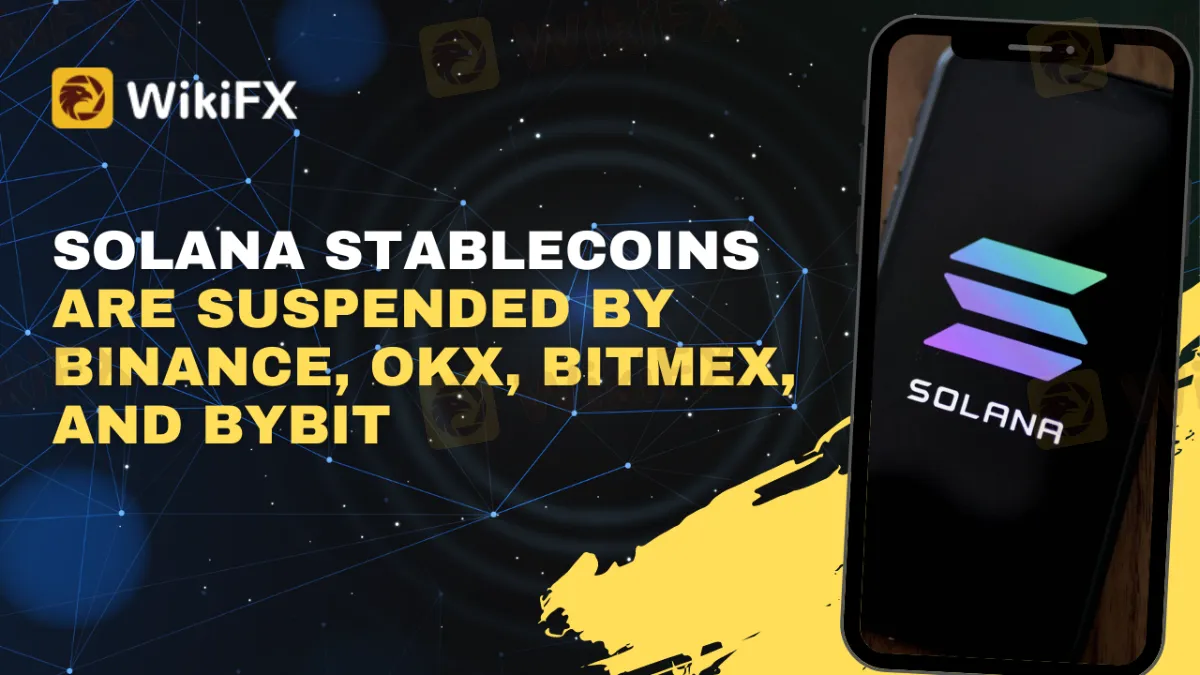简体中文
繁體中文
English
Pусский
日本語
ภาษาไทย
Tiếng Việt
Bahasa Indonesia
Español
हिन्दी
Filippiiniläinen
Français
Deutsch
Português
Türkçe
한국어
العربية
Solana Stablecoins Are Suspended By Binance, OKX, Bitmex, and Bybit
Abstract:At least five cryptocurrency exchanges told their customers today that the Solana network has stopped all deposits and withdrawals of Tether's USDT and Circle's USDC.

As the FTX problem continues to shake up the cryptocurrency world, big platforms like Binance, OKX, BitMex, and ByBit have said that the halt will start right away. The two stablecoins exist on many other blockchain networks, but users who want to trade either of them on Solana are not allowed to. Binance's email went on to clarify that deposits in other ecosystems, like Ethereum and Cronos, would be unaffected.
In response, Circle, the company that gives out USDC, told users that their stablecoin based on Solana is working fine and that sending or receiving the stablecoin is not a problem. “USDC may always be redeemed for US dollars.” “Any sum.” “Any time.” “Free of charge.” “Always,” the company stated.

Tether, the world's largest stablecoin issuer, has distanced itself from the liquidity problem that plagued FTX and Alameda Research, claiming it had no links to Samuel Bankman-Crypto Fried's empire. Tether's CTO, Paolo Ardoino, wrote a thread to soothe market participants' anxieties and uncertainties about the link between FTX and its USDT cryptocurrency.
He also stated that, despite having previously issued and redeemed a significant amount of USDT, Alameda has no credit exposure with the faltering cryptocurrency trading firm.
Although these exchanges did not explain why they opted to stop Solana transactions, the decision comes during one of the most volatile weeks in cryptocurrency history. The story reached its climax when Sam Bankman-crypto Fried's empire filed for bankruptcy, citing a lack of cash flow and a “run on the bank”-like situation as the reason.
Aside from FTX's problems, the insolvent exchange and its creator have strong links to the Solana ecosystem. Alameda Research, Bankman Crypto Fried's trading department, funded $314 million for Solana's development team.
Due to the collapse of FTX's native token, the price of SOL has lost about two-thirds of its market value as investors continue to leave. At this point, the recent suspensions might be seen as a precautionary measure to protect FTX from overexposure to Solana's network while waiting for the situation to at least normalize.
Solana is an open-source blockchain designed to compete with Ethereum. It supports smart contracts, including non-fungible tokens (NFTs), as well as a wide range of decentralized apps (dApps).
Alameda Research and FTX have a lot of control over the SOL token, which can be staked to help protect the network and be used to send value.
Bitcoin, on the other hand, is still worth more than $16,600 as of Friday afternoon, almost the same as it was on Monday but 5% less than a week earlier. Before the collapse of prominent cryptocurrency exchange FTX two weekends ago, the world's biggest cryptocurrency traded at $21,000. The two-week crash sent Bitcoin to two-year lows. In the last week, it has ranged between $16,200 and $17,000.
After topping at $1,277 for the week on Tuesday, Ethereum is now trading a little over $1,200. Before the FTX drop, the #2 cryptocurrency was trading at $1,650.
What is FTX
FTX is one of the major cryptocurrency exchanges in the world. It lets people trade digital currencies for other digital currencies or regular money, and the other way around. Mr. Bankman-Fried was in charge of it, and it was situated in the Bahamas. It has spent millions of dollars pushing US lawmakers to pass crypto-friendly legislation.

Check out more of FTX here: https://www.wikifx.com/en/dealer/1257143466.html
Stay tuned for more FTX news.
Download the WikiFX App from the App Store or Google Play Store to stay updated on the latest news.

Disclaimer:
The views in this article only represent the author's personal views, and do not constitute investment advice on this platform. This platform does not guarantee the accuracy, completeness and timeliness of the information in the article, and will not be liable for any loss caused by the use of or reliance on the information in the article.
Read more

Gigamax Scam: Tracking Key Suspects in RM7 Million Crypto Fraud
Malaysian authorities are actively pursuing seven individuals linked to the Gigamax investment scam, which has defrauded investors of over RM7 million. The suspects include an Indonesian national, identified as Awaludin, who is believed to be the mastermind behind the scheme, and six Malaysians who served as promoters and speakers for the fraudulent operation.

Singaporean Arrested in Thailand for 22.4 Million Baht Crypto Scam
Thai authorities have apprehended a 32-year-old Singaporean man suspected of being part of a transnational syndicate involved in cryptocurrency scams. The group is accused of defrauding victims of more than 22.4 million baht (S$886,000) through a fraudulent trading platform.

Kraken and BitGo to Handle FTX Payouts Starting January 2025
Kraken and BitGo will oversee the first FTX payouts starting January 3, 2025. 98% of creditors receive at least 118% of their claims in cash.

FCA Seeks Input to Shape UK Crypto Market Regulations
UK FCA seeks public feedback on crypto rules to improve market transparency, protect consumers, and support growth. Comments are open until March 2025.
WikiFX Broker
Latest News
HTFX Clone Firm Exposed
Spotware Unveils cTrader Store, Global Marketplace for Algo Creators
Elderly Trader Loses RM2.1M in WhatsApp Forex Scam
Gigamax Scam: Tracking Key Suspects in RM7 Million Crypto Fraud
TradeExpert: A Forex Broker Under Scrutiny
Singaporean Arrested in Thailand for 22.4 Million Baht Crypto Scam
Trader Turns $27 Into $52M With PEPE Coin, Breaking Records
ASIC Sues HSBC Australia Over $23M Scam Failures
WikiFX Review: Is IQ Option trustworthy?
IOTA Leads Blockchain Innovation in Southeast Asia by 2025
Currency Calculator


